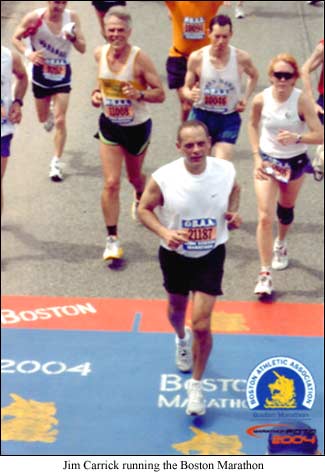Jim Carrick’s 1-year Anniversary with a RRP
 One year to the day after Jim Carricks operation to remove his cancerous prostate, he ran the Boston Marathon.
One year to the day after Jim Carricks operation to remove his cancerous prostate, he ran the Boston Marathon.
Racing isnt important to him. But his wife, three daughters, friends, business, and local community are.
The Marathon was to show his family, himself, and other men that prostate cancer couldnt stop him from staying involved in life.
Carrick doesnt consider his participation in the event to be evidence of an easy recovery, but instead, evidence of a man on a mission.
Im the kind of guy who likes to fight back when Im challenged, he said. The after effects of my surgery were a little tougher than I had expected. Still, the first week after my RRP, I was walking a mile and carrying my catheter bag with me.
Within a month, he was walking five miles and wearing a pad to deal with exercise incontinence, a not unusual condition that usually improves with time.
Im much better now, but I understand I might not function as well as I did. Id say Im ready to live with those issues but, in fact, I dont even think theyre issues, he said.
Carrick was 45 when he requested a PSA test. His doctor said he didnt think it was necessary, but Carrick did. His wife had just recovered from devastating surgery and treatment for a rare form of cancer, and one of his responses to her illness was to have a complete physical, including a PSA.
I wasnt going to leave anything out, Carrick said.
Only after being diagnosed and talking with his mother did he learn that his uncle and grandfather both had prostate cancer.
Medical family histories, he discovered, are important to know.
The hardest part of his diagnosis was telling his three daughters so shortly after they had dealt with their mothers cancer. He knew they would be watching his recovery carefully.
Although Carrick is athletic and had participated in 10K races, the last thing he thought hed be doing one year after his RRP was to run the Boston Marathon.
The circumstances for his participation just fell into place.
“It is possible to get through this disease.”
First, he saw the run date a year to the day after his surgery. Then he found out that some numbers for the Marathon were allotted to people who donated to a cancer charity.
I couldnt think of a better way to show my daughters, my friends, and other men with prostate cancer that it is possible to get through this disease. And running to donate money for cancer research made it even better.
Carricks accomplishment was no small feat.
Balancing hydration and exertion is a concern for anyone but for someone with exercise incontinence, its a real dilemma.
Carrick erred on the side of not wanting to worry about going to the bathroom or leaking during the race. Dehydration became a problem.
I saw my share of medical tents during the race, he said. I ran the first half strong, but the second half was far more difficult.
Still, I knew I had to finish the 26 miles, even if it took all night. A mission needs to become a mission accomplished.
He finished the Marathon on the second hottest day in Boston Marathon history and raised over $30,000 for cancer charities.
Carrick does not view himself as a cancer victim.
My wife, Peggy, and I are using our personal experiences with cancer to show people how they go about beating it.
If you have been a patient of Dr. Catalonas and have a personal story you would like to share with QUEST readers, please send your name, address, and telephone # to:
PO Box 11716,
St. Louis, MO 63105
or call 314 725-7747 and leave a message (with your name and telephone #).











